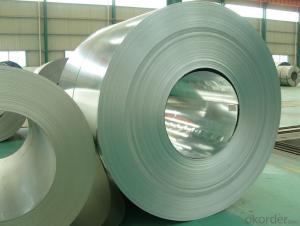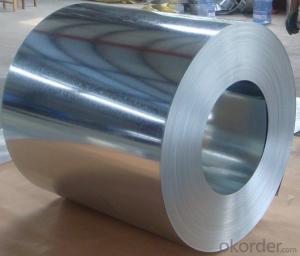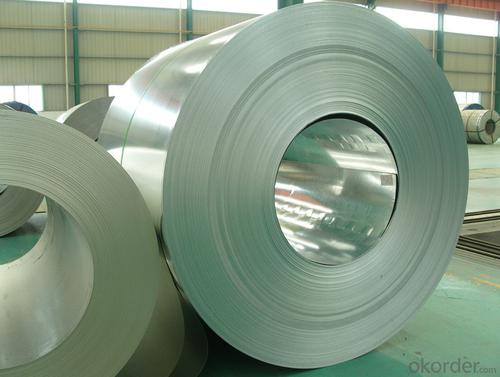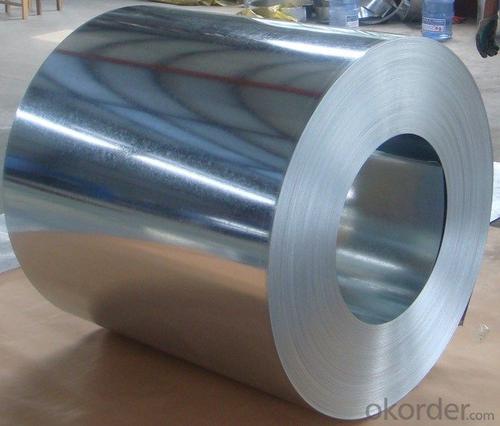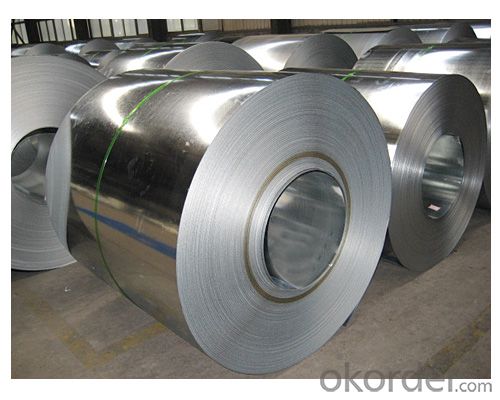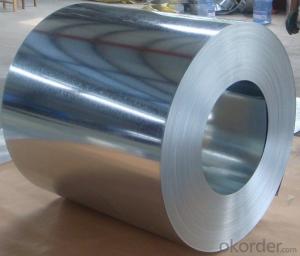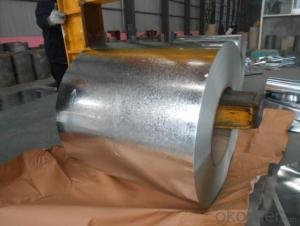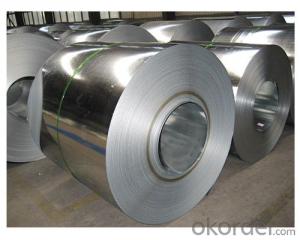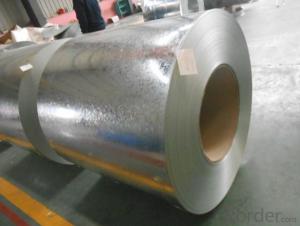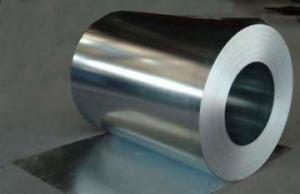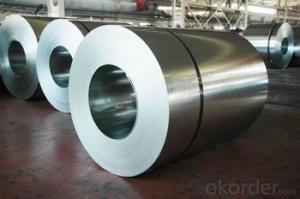Galvanized Steel Sheet in Coils Prime Quality Best Seller
- Loading Port:
- Shanghai
- Payment Terms:
- TT OR LC
- Min Order Qty:
- 100 m.t.
- Supply Capability:
- 10000 m.t./month
OKorder Service Pledge
OKorder Financial Service
You Might Also Like
1.Structure of Galvanized Steel Coil Description:
Hot-dip galvanized steel coils are available with a pure zinc coating through the hot-dip galvanizing process. It offers the economy, strength and formability of steel combined with the corrosion resistance of zinc.
Zinc coating :40-180g( as required)
Coil weight: 4-10 MT(as required)
5.FAQ of Galvanized Steel Coil
We have organized several common questions for our clients,may help you sincerely:
1.How to guarantee the quality of the products?
We have established the international advanced quality management system,
• High corrosion resistance
• High strength
3.Galvanized Steel Coil Images
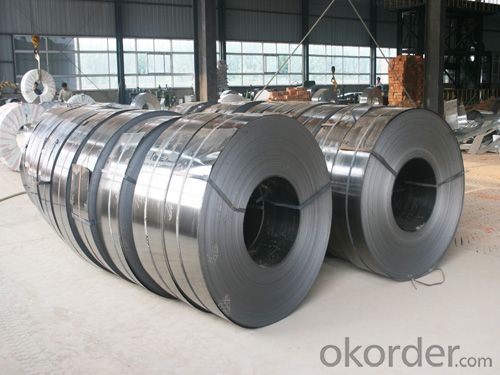
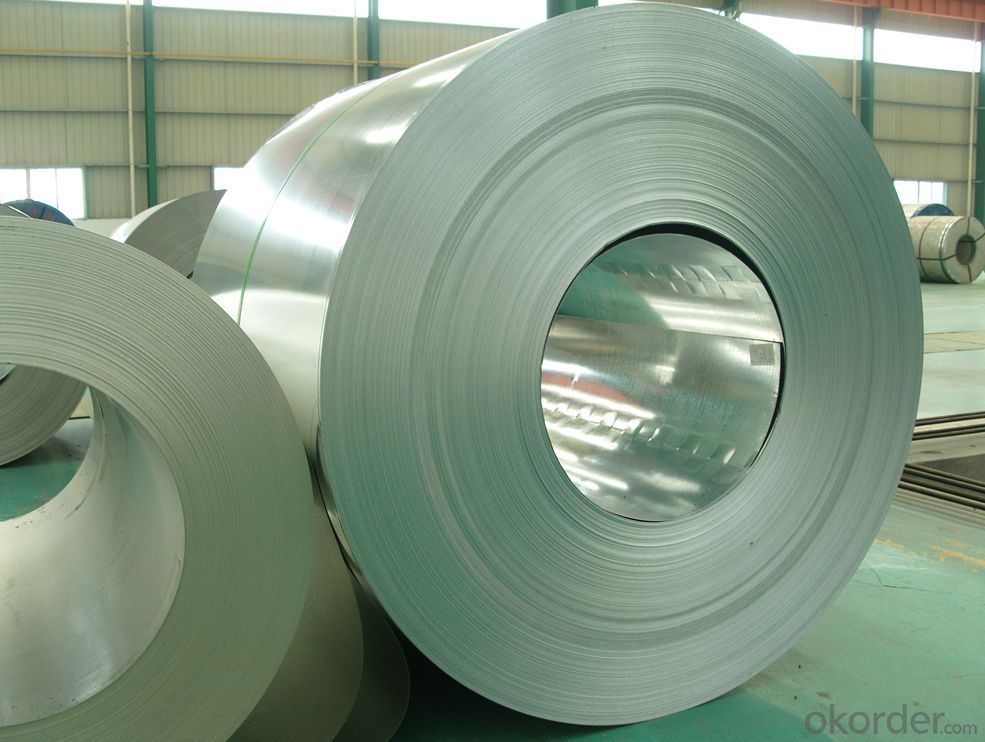
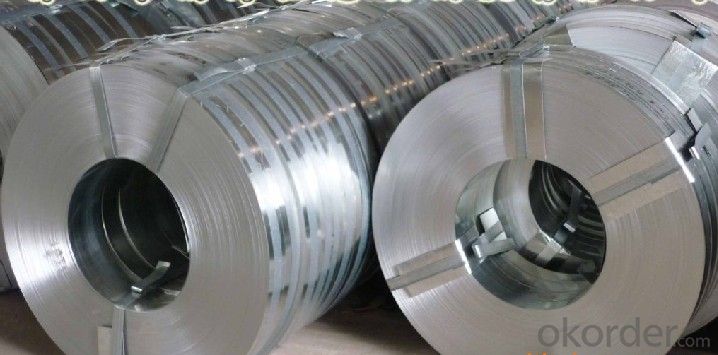
4.Galvanized Steel Coil Specification
Width:914-1250mm(914mm, 1215mm,1250mm,1000mm the most common)
Grade : SGCD,SGCH, Q195,DX51D
Operate Standard: ASTM A653M-04/JIS G3302/DIN EN10143
2.Main Features of the Galvanized Steel Coil:
• Good formability
• Rust- proof ability
- Q: What is the average turnaround time for processing steel coils?
- The average turnaround time for processing steel coils can vary depending on several factors such as the size and complexity of the coils, the specific processing requirements, and the efficiency of the manufacturing facility. However, in general, the average turnaround time for processing steel coils can range from a few days to a couple of weeks.
- Q: What are the different types of steel coil packaging materials for export?
- There are several different types of steel coil packaging materials that are commonly used for export: 1. Steel Strapping: This is one of the most common and widely used materials for packaging steel coils. Steel strapping is strong and durable, providing excellent protection during transportation. It is available in different widths and thicknesses to accommodate different coil sizes. 2. Stretch Film: Stretch film is a flexible and elastic material that is often used to wrap steel coils. It provides a tight and secure packaging, preventing the coils from shifting or falling during transit. Stretch film is also lightweight, which helps to reduce shipping costs. 3. Corrugated Cardboard: Corrugated cardboard is often used as an outer packaging material for steel coils. It provides additional protection against external impacts and acts as a cushioning material. Corrugated cardboard is available in various strengths and sizes to suit different coil dimensions. 4. Wooden Crates: Wooden crates are a popular choice for packing larger steel coils. They provide a sturdy and robust packaging solution, offering excellent protection against impacts, moisture, and other environmental factors. Wooden crates can be customized to fit specific coil sizes and are often used for heavy-duty or long-distance shipments. 5. Plastic Strapping: Plastic strapping is an alternative to steel strapping, especially for lighter coils. It is lightweight, easy to handle, and resistant to rust and corrosion. Plastic strapping is available in different colors, allowing for easy identification and sorting. 6. VCI (Volatile Corrosion Inhibitor) Packaging: VCI packaging materials are used to protect steel coils from corrosion during export. These materials release a vapor that forms a protective layer on the surface of the coils, preventing rust and corrosion even in high humidity or harsh environments. It is important to consider the size, weight, and specific requirements of the steel coils when choosing the appropriate packaging material for export. Additionally, compliance with international shipping regulations and standards should be ensured to guarantee a safe and efficient transportation process.
- Q: What is the average lifespan of a steel coil?
- The average lifespan of a steel coil can vary depending on various factors such as its quality, usage, maintenance, and environmental conditions. However, on average, a well-maintained steel coil can last anywhere from 10 to 30 years.
- Q: it isn't a SIGG water bottle or any other brand, as it's from thingsengraved what I'm wondering is, is this just as good as a SIGG water bottle, or is there any difference?
- Should be OK- that's reputable vendor. Suggest initial flush insides with very mild acid (fill ~20% with mild vinegar, Pepsi, etc., then shake 1 minute) then rinse 2 times, then look inside to confirm it looks clean.
- Q: How are steel coils used in the manufacturing of medical equipment?
- Steel coils are used in the manufacturing of medical equipment as they provide strength, durability, and flexibility for various components. These coils are often used in the production of surgical instruments, medical devices, and diagnostic equipment where precision and reliability are crucial.
- Q: How do steel coil manufacturers meet customer specifications?
- Steel coil manufacturers meet customer specifications by following a comprehensive and systematic approach that involves various stages and processes. Here are some key steps they take: 1. Understanding customer requirements: Manufacturers initiate the process by thoroughly understanding the specific requirements of their customers. This includes determining the desired dimensions, tolerances, mechanical properties, surface finish, and any other specific characteristics needed. 2. Material selection: Based on the customer's requirements, manufacturers select the appropriate type and grade of steel to meet their specifications. This involves considering factors such as strength, corrosion resistance, formability, and cost-effectiveness. 3. Production planning: Manufacturers carefully plan their production processes to ensure that customer specifications are met. This involves determining the appropriate manufacturing techniques, equipment, and resources required. 4. Coil processing: Steel coils are processed through various stages such as hot rolling, cold rolling, annealing, pickling, and coating, depending on the customer's specifications. Each step is carefully controlled to achieve the desired properties and dimensions. 5. Quality control: Throughout the manufacturing process, strict quality control measures are implemented to ensure that the coils meet the customer's specifications. This includes regular inspections, testing, and compliance with industry standards. 6. Customization and flexibility: Steel coil manufacturers often offer customization options to meet specific customer needs. They have the capability to adjust the thickness, width, and length of the coils to match the desired specifications. 7. Communication and collaboration: Effective communication and collaboration between the manufacturer and the customer are crucial to meeting specifications. Manufacturers work closely with their customers to address any concerns or modifications required during the manufacturing process. 8. Documentation and certification: Once the steel coils are manufactured, manufacturers provide detailed documentation and certifications to ensure traceability and compliance with customer specifications. This includes providing test reports, material certificates, and any other necessary documentation. By following these steps, steel coil manufacturers can consistently meet customer specifications, ensuring that the final product meets the desired requirements and quality standards.
- Q: How are steel coils used in the production of industrial machinery?
- Steel coils are used in the production of industrial machinery as they provide a strong and durable material for various components. These coils are often shaped and cut to specific sizes to create parts such as gears, shafts, and frames, which are essential for the functioning of machinery. The high strength and flexibility of steel coils make them ideal for withstanding heavy loads and harsh operating conditions, ensuring the reliability and longevity of industrial machinery.
- Q: What are the different methods of coil joining for steel coils?
- There exists a variety of techniques for joining steel coils, each with its own advantages and limitations. Some commonly employed methods encompass the following: 1. Welding: Among the most popular methods of coil joining, welding involves the use of heat to melt and fuse the edges of steel coils. Arc welding, resistance welding, or laser welding can be utilized for this purpose. Welding offers a robust and durable joint, although it can be time-consuming and necessitate skilled operators. 2. Mechanical fastening: This technique entails the use of mechanical fasteners like clips, staples, or bolts to connect the edges of steel coils. Mechanical fastening is relatively quick and straightforward, and it allows for easy disassembly if needed. However, the joint may not be as strong as welding and can be prone to loosening over time. 3. Adhesive bonding: Adhesive bonding involves the use of a suitable adhesive or glue to bond the edges of steel coils. This approach yields a strong and uniform joint, while also providing protection against corrosion. However, adhesive bonding may require surface preparation and curing time, and it might not be suitable for high-temperature applications. 4. Interlocking or tongue-and-groove joints: This method involves shaping the edges of steel coils in a manner that they interlock or fit together like puzzle pieces. Interlocking joints provide good alignment and are easily assembled and disassembled. Nevertheless, they may not yield as strong a joint as welding or mechanical fastening. 5. Coil-overlapping: In this method, the edges of steel coils are overlapped and clamped together using mechanical means. Coil-overlapping is a simple and cost-effective technique, albeit it may not yield a strong joint and can result in uneven coil edges. When selecting the appropriate method of coil joining for steel coils, it is crucial to consider factors such as application requirements, strength requirements, cost, and production efficiency.
- Q: How do steel coils contribute to strength and durability in manufacturing?
- Strength and durability in manufacturing are enhanced by steel coils in several ways. Firstly, steel possesses inherent strength due to its high tensile strength, enabling it to bear heavy loads and resist deformation. Coiling steel involves hot rolling or cold rolling, which further enhances its strength and durability. During hot rolling, steel is heated to high temperatures and passed through rollers to shape it into a coil. This process aligns the steel's grain structure, resulting in a more uniform material with reduced internal stresses. Consequently, it becomes stronger and more resilient, maintaining its structural integrity even during manufacturing processes like bending, stamping, and forming. In contrast, cold rolling involves passing steel through rollers at room temperature. This process not only increases strength and hardness but also improves the surface finish. Cold-rolled steel coils are known for their smooth and uniform appearance, making them ideal for applications where aesthetics are crucial. Moreover, steel coils can be coated with various protective layers to enhance durability. Coatings like zinc or polymer-based ones act as barriers against corrosion, moisture, and other environmental factors that can weaken the steel. By preventing rust and degradation, these coatings prolong the lifespan of steel coils and the products they are used in, making them more durable and cost-effective in the long term. In summary, steel coils contribute to strength and durability in manufacturing by providing a resilient material capable of withstanding heavy loads and resisting deformation. The hot rolling and cold rolling processes further enhance the steel's strength and uniformity, while protective coatings prevent corrosion and extend the coils' lifespan. Ultimately, steel coils are indispensable components in manufacturing, enhancing the strength and durability of a broad range of products.
- Q: I just got a set of all-clad Stainless steel frying pans, they are very nice yet they didn't come w/ instructions to care for them. I have never cooked w/ stainless steel cookware so I really don't know much about them. I was told they should have a lifetime warranty on them, but I don't want to reck them. I would appreciate any information I can get on stainless steel cookware. Thanks.
- I have stainless steel as well. i clean them like I would with any pan. however once and a while when the bottems get kind of blackened due to spillage or flames I take one of those magic eraser things to clean them up. once every 2-3 months I polish the outsides with a nice stainless steel cleaner.
Send your message to us
Galvanized Steel Sheet in Coils Prime Quality Best Seller
- Loading Port:
- Shanghai
- Payment Terms:
- TT OR LC
- Min Order Qty:
- 100 m.t.
- Supply Capability:
- 10000 m.t./month
OKorder Service Pledge
OKorder Financial Service
Similar products
Hot products
Hot Searches
Related keywords
